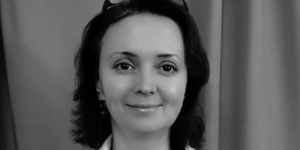
Julia Boytsova is a neurophysiologist and EEG researcher with the Institute for Biomedical Problems of the Russian Academy of Sciences, Moscow. She has been involved with the Russian Tukdam Research Project since 2018 and with the Joint Collaborative Tukdam Project with CHM since 2020. Her particular scientific interests include investigating default brain networks (resting states), synesthesia, creativity, emotions, imagination practices, and altered states of consciousness. She is the author or co-author of more than 50 scientific publications.
Her investigations focus on brain organization of altered states of consciousness (ASC); cognitive processes in healthy brains and in patients with psychiatric disorders. She also has conducted work on brain organization during creativity thinking. In a joint collaboration between the Institute of Human Brain of Russian Academy of Sciences with the Russian National Institute of Performing Arts in St. Petersburg, Julia investigated brain mechanisms involved in creative imagination and emotional control of actors during actor transformation into another character on stage. She also studied the peculiarities of the brain's attention systems when switching the subject's attention from the outside world to internal mental processes.
Her approach combines electroencephalogram (EEG) studies at the junction of neurophysiology and psychology, and combining neurophysiological data on brain work obtained by both EEG and positron emission tomography (PET).
Her current field of research focus is the neurophysiology of creative abilities.
Education
PhD, Neurophysiology
Links
Related Studies
The Field Study of Long-term Meditation Practitioners and the Tukdam Post-death Meditative State
A global community of field researchers are collaborating on a study of an ancient monastic post-mortem meditative state known as tukdam, practiced by present-day expert Tibetan Buddhists and how such a practice might offer insight into mental, spiritual, and physical well-being during the death process, both for the dying and for their support community.


